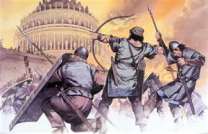I am sometimes lectured by people about Constitutional intent and historical “facts” regarding the evolution of the Bill of Rights, as well as governmental responsibilities and the separation of powers.
When it comes to American history, however, I remember things in much the same way that Bullwinkle  remembers everything he ever ate (if you’re a Rocky and Bullwinkle fan, you’ll know what I mean).
remembers everything he ever ate (if you’re a Rocky and Bullwinkle fan, you’ll know what I mean).
The information just fits neatly for some reason in a corner of the brain, ready for deployment if the need for it ever arises.
A fundamental misunderstanding in today’s discourse is the difference between a direct (or pure) democracy and what we have in the United States. To be clear, we have a representative democracy (a republic) in which citizens form a political unit, usually under the auspice of a charter, which directs them to elect representatives who will govern.
Republics are usually free states, not because of free elections, but because they are bound by a charter (our Constitution and the Bill of Rights), which define and limit the powers of the state. The willingness of the people to live by that charter, is what keeps people free.*
A “Democracy,” on the other hand, is government by the majority, and this is where people get lost. This could also be called “mob rule.” There is still a restricted group of citizens in a Democracy, but this group rules and directly runs the state. The group may delegate tasks to individuals, such as governorships, but there is no question that the ruling force in a democracy is not a charter, but the vote of the majority.
The frustrating discrepancy in today’s argument is that people who are calling themselves “Constitutional purists” are the same people who believe that the will of the majority is the purpose of our charter.
 The concern at the Constitutional Convention was that the government they created would be too democratic because a majority could vote itself anything it wanted. The slide into democracy was foreseen by John Adams who observed:
The concern at the Constitutional Convention was that the government they created would be too democratic because a majority could vote itself anything it wanted. The slide into democracy was foreseen by John Adams who observed:

“Our experiment with being a Constitutional Republic is rapidly coming to an end….Democracy never lasts long. It soon wastes, exhausts, and murders itself.”
Lord Acton, the English Catholic historian writes, in The History of Freedom in Antiquity: “The one pervading evil of democracy is the tyranny of the majority…that succeeds, by force or fraud, in carrying elections.”
No less than James Madison writes of the same concern in The Federalist Papers. In the areas of civil and religious rights, Madison predicted: “If [one] sect form a majority and have the power, other sects will be sure to be depressed.”
One of the most harmful effects is that people actually begin to incorporate tenets of direct democracy into a representative democracy; like propositions, referendums and ballot initiatives. Truth isn’t determined by popularity. Theoretically, in a pure democracy, a majority could vote away any inalienable right, even free speech.
According to Plato (“The Republic”) a democracy will always become a tyranny, either by majority, or if the majority screw things up so badly and a tyrant seizes power from the chaos.** Reason becomes irrelevant as whatever the majority wants it gets and regardless of how unprincipled it may be. There is no such thing as Inalienable Rights in a system where they could be voted away.
“When ignorance of this distinction contends that this country was founded as a democracy, it does a disservice to all of the people who created and have fought for our republic.” – Historian, Alexander Marriott

- * ** “Republic? Democracy? What’s the Difference?” Alexander Marriott (Capitalism Magazine, Jan. 2003)